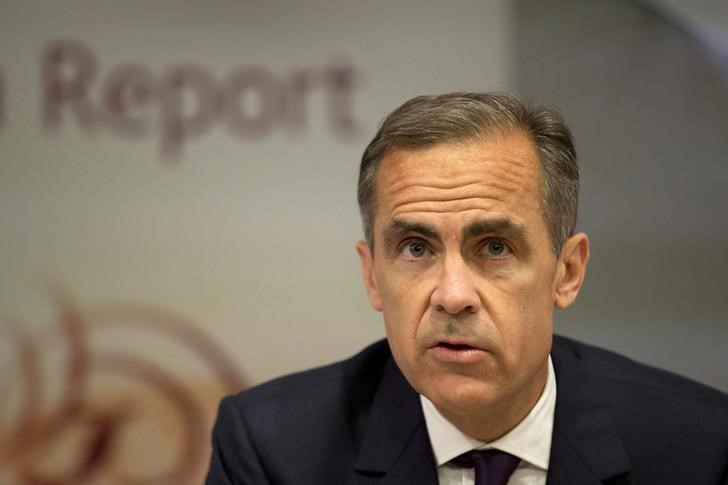Investing.com - Bank of England (BoE) governor Mark Carney insisted Thursday that the British monetary authority raised rates today because it was concerned about where inflation was headed and believed it was time to take the foot off the accelerator, while warning that the UK’s departure from the European Union (EU), known as Brexit, is the biggest factor in uncertainty about the outlook.
After the BoE increased the benchmark interest rate from a record low of 0.25% to 0.50% in what was the first hike in a decade, Carney pointed to the fact that inflation was around 3% in September and was expected to have inched higher last month.
BoE concerned about inflation
“But it isn’t so much where inflation is now, but where it’s going that concerns us,” Carney stated in the press conference.
He explained that the Monetary Policy Committee (MPC) was responsible for bringing inflation back to target and holding it there once temporary effects, “predominantly those caused by the referendum-related fall in sterling, dissipate”.
“In many respects, the decision today is straightforward: with inflation high, slack disappearing, and the economy growing at rates above its speed limit, inflation is unlikely to return to the 2% target without some increase in interest rates,” he explained.
Carney noted that the UK was not in “normal times” and insisted that the Brexit will redefine the UK’s relationship with Europe, its largest trade and investment partner.
“And it will have consequences for the movement of goods, services, people and capital as well as the real incomes of UK households,” he said.
He noted that the MPC feels that there is a little less slack in the economy that at the time of the previous inflation report in August and that the pace at which the economy can grow without generating inflationary pressures has fallen relative to pre-crisis norms.
“With unemployment at a 42 year low, inflation running above target and growth just above its new, lower speed limit, the time has come to ease our foot off the accelerator,” Carney said, adding that the rate increase will “help bring inflation back towards its 2% target, while still supporting jobs and growth”.
In the question and answer period, Carney was asked if he was comfortable with the market outlook that the BoE would hike rates twice more in the next three years. He responded that on a “broad-brush” basis it would get the BoE roughly to where it wants to be on inflation and growth.
However, he earlier declined to give a target on how high interest rates would need to be for the BoE to begin unwinding its bond-buying program.
Brexit is “biggest determinant” of outlook
For the future, Carney indicated that the BoE will continue to provide support to jobs and activity and that the “MPC continues to expect that any future increases in interest rates would be at a gradual pace and to a limited extent.”
Carney also noted that Brexit continued to be the “biggest determinant” of the outlook for inflation and activity.
“The decision to leave the European Union is already having a noticeable impact,” he said.
Carney explained that the fact that inflation was currently above target was due to the effects on import prices of the referendum-related fall in sterling and that uncertainties associated with Brexit are weighing on domestic activity, which has slowed even as global growth has risen significantly.
He pointed out that the impact of Brexit on the forecast will evolve as negotiations between the UK and the EU progress.
“In particular, any resolution of the uncertainty about the nature of, and transition to, the UK’s future relationship with the EU insofar as it affects the behavior of households, businesses and financial market participants would prompt a reassessment of the economic outlook,” Carney concluded.
After Carney’s speech, the pound remained under pressure, having previously tumbled when the policy decision was originally announced. GBP/USD traded at 1.3112 from around 1.3134 ahead of the Carney’s appearance, EUR/GBP was at 0.8877 from 0.8876 earlier, while GBP/JPY traded at 149.60 compared to 149.87 prior to the conference.
That compared to 1.3219, 0.8816 and 150.86, respectively, just prior to the BoE rate hike announcement.
Meanwhile, European stock markets showed mixed trade, with British equities extending earlier gains. London’s FTSE 100 gained 0.59%. The benchmark Euro Stoxx 50 lost 0.37%, France's CAC 40 traded down 0.18%, while Germany's DAX fell 0.11%.
